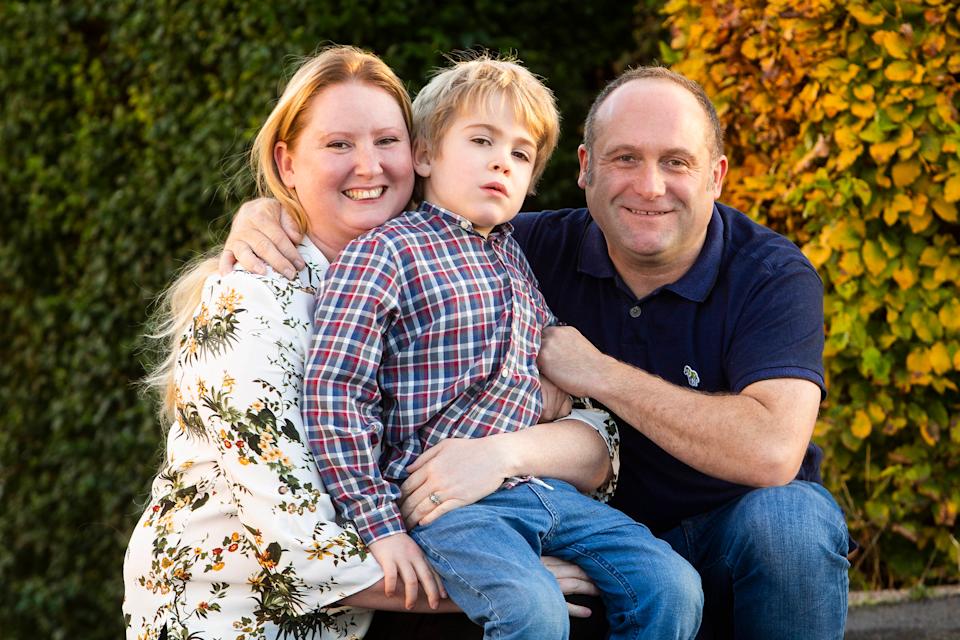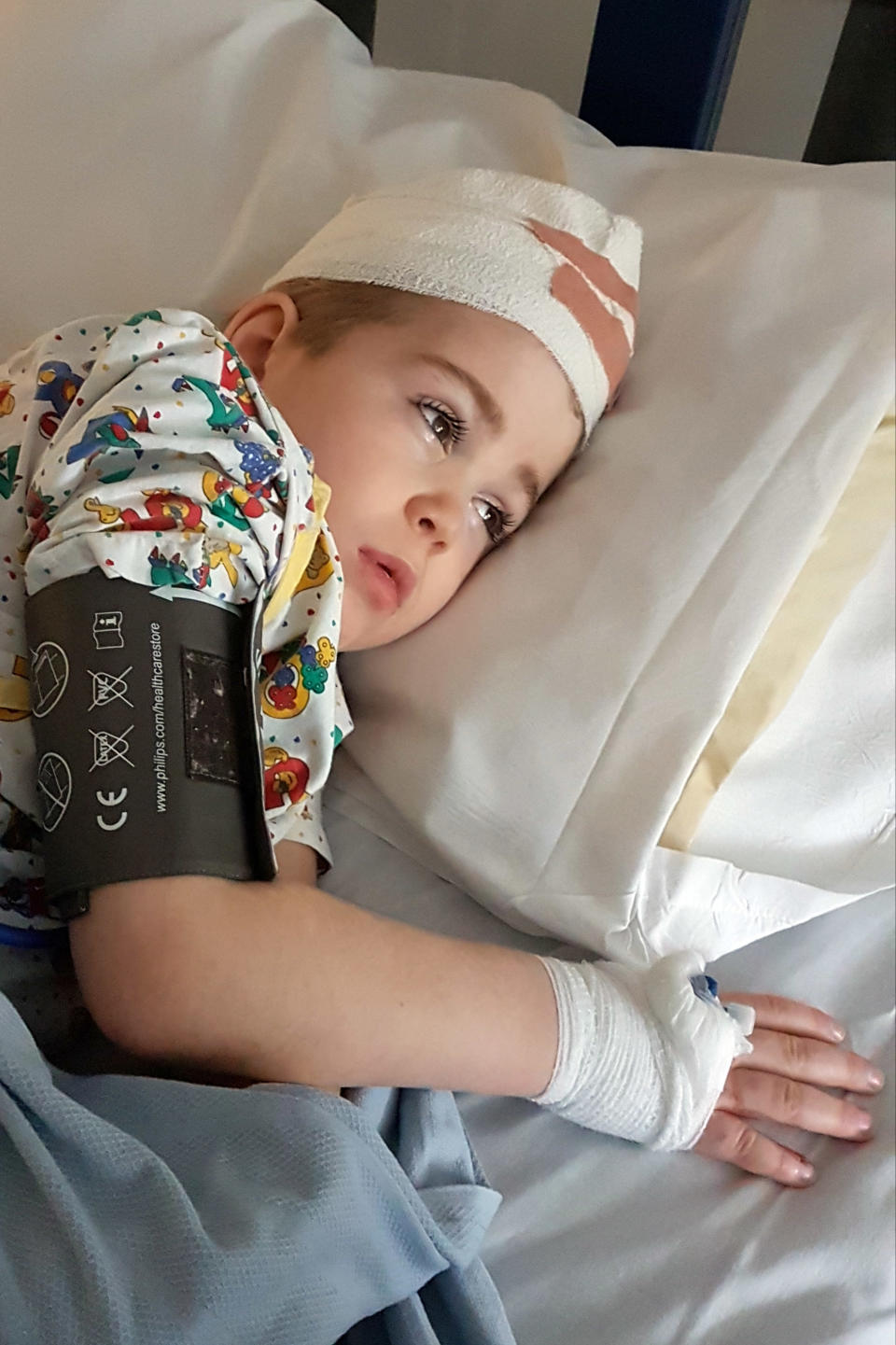Dementia sufferer, 5, who forgot his parents now recognises them thanks to a new treatment
A five-year-old dementia sufferer who forgot his parents recognises them again after a pioneering treatment.
Harley Bond, from Sheffield, was diagnosed with Sanfilippo syndrome at just three.
READ MORE: Excessive napping could be a sign of Alzheimer's disease
The rare disorder causes the brain to “fill up with waste”, leading to irreversible damage, according to the Sanfilippo Children’s Foundation.
Harley’s parents Wayne Bond, 47, and Emma Siddal, 38, were devastated when their son no longer knew who they were, and stopped saying “mummy” and “daddy”.

With no cure or treatment, the youngster was enrolled onto a clinical trial at Great Ormond Street hospital (GOSH).
After having a device implanted into his brain, it releases small amounts of an enzyme that is missing in Sanfilippo sufferers.
Gradually, Harley’s speech started to improve, with him now calling out for his parents.
READ MORE: Dementia diagnosis at a 'record high': Here's how to spot the signs
Sanfilippo syndrome affects around one in every 70,000 children, Sanfilippo Children’s Foundation statistics show.
The inherited disorder disrupts one of the chemical reactions that should take place naturally in the body.
This occurs due to a missing enzyme that normally breaks down and recycles a large sugar molecule called heparan sulphate.
Sanfilippo is considered a form of childhood dementia, with symptoms including loss of speech, severe hyperactivity, insomnia, loss of mobility, heart problems, seizures and premature death.

Harley’s parents first became concerned when he was just a few months old.
“He was born completely fine and developing well, but then everything changed,” Mr Bond said.
“He was really boisterous with other kids and his nose was always runny, he kept getting infections”.
By the time he turned three, his speech started to deteriorate.
Harley was later diagnosed with Sanfilippo Syndrome type B in 2016.
The condition was four subtypes - A, B, C and D - depending on the enzyme that is missing.
The progressive condition caused Harley to develop sleep apnoea, which led to him not breathing during the night.
He would later try and eat plants, bushes, and rocks.
“He couldn’t remember simple things like knowing how to use the toilet or what was food and what was not,” Mr Bond said.
READ MORE: Confusion over money could be an early sign of dementia
Medics from GOSH got in touch with Harley’s parents to suggest he enrol on an experimental treatment.
“The hospital spoke to us and let us know about this new trial, but they told us he would need to do a year of studying to assess his memory,” Mr Bond said.
“Luckily his memory was good enough to be able to get onto the trial.
“He could remember enough of what he was told to show there was hope he could be saved.”
Although the trial is going well, Harley’s condition temporarily took a turn for the worse.
“He had a bad patch for a few months”, Mr Bond said.
“He didn’t know who we were and couldn’t even call us mummy or daddy.
“The whole thing is soul destroying.”
Miss Siddal, who cares for Harley full time, added: “It was heartbreaking in the months he couldn’t recognise us. He struggled to make eye contact with us”.

Despite the setback, Harley is responding well to the implant overall.
“It’s giving us a little bit of hope for the future”, Mr Bond said.
“We realise it won’t cure him, but it might give us a few extra precious years with our brave son.”
The life expectancy for a Sanfilippo patient is between 10 and 20 years, according to the Team Sanfilippo Foundation.
“With the clinical trial he is on, he has good days and bad says”, Mr Bond said.
“Naturally this condition is supposed to just get worse and worse, which isn’t the case with Harley, sometimes he’s completely in control of himself but other days he can’t move.”
READ MORE: Early Signs Of Alzheimer's Disease Found In Patients As Young As 20
Despite all he has endured, in many ways, Harley is like any other young child.
“When you watch him go through all of this, he seems invincible, he rarely complains”, Mr Bond said.
“He’s such a strong lad and gives us glimpses of his personality when he can, which we love.”
The couple work hard to stay positive in spite of the setbacks.
“We have good and bad days, but we’re cherishing the time we have with him and hopefully the treatment will work, and we’ll have him for many more years to come,” Mr Bond said.
“Sometimes he forgets who we are and it’s awful, but we always remain strong and it’s made our family a unit of strength because we have been through it all and remain resilient together.”
Miss Siddal added: “We are so proud of everything our little boy is achieving, we thought he would just get worse but he seems to be improving very slightly in some cases.”
The couple are speaking out to raise awareness of childhood dementia.
“Knowing our son has dementia was hard to comprehend, but that’s why it’s so important everyone starts to know it is possible and it isn’t just older people this disease can affect,” Mr Bond said.
The trial is being offered by two US pharmaceutical companies.
Thomas Mathers, CEO of the drug giant Allievex - one of the firms running the trials - added: “These children have a genetic mutation which stops them from being able to produce a certain enzyme they need otherwise their neurones will be killed off.
“We have a device that is implanted into the child’s head which releases a synthetic version of the missing enzyme directly into the brain that washes the sugar build up which causes the neurones to be killed.
“Worldwide, we have 22 children who have used or are using this trial.”


